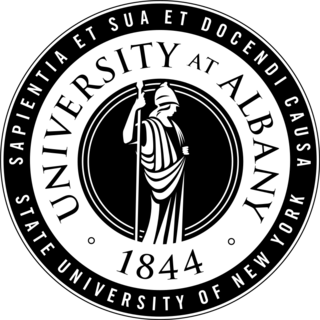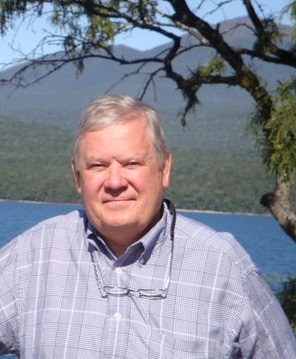Social constructivism is a sociological theory of knowledge according to which human development is socially situated, and knowledge is constructed through interaction with others. Like social constructionism, social constructivism states that people work together to actively construct artifacts. While social constructivism focuses on the artifacts (constructs) that are created through social interactions, social constructionism focuses on social constructions as active processes, rather than outcomes.

The State University of New York at Albany, commonly referred to as the University at Albany, UAlbany or SUNY Albany, is a public research university with campuses in Albany, Rensselaer, and Guilderland, New York. Founded in 1844, it is one of four "university centers" of the State University of New York (SUNY) system.
A KWL table, or KWL chart, is a graphical organizer designed to help in learning. The letters KWL are an acronym, for what students, in the course of a lesson, already know, want to know, and ultimately learn. It is a part of the constructivist teaching method where students move away from what are considered traditional methods of teaching and learning. In this particular methodology the students are given the space to learn by constructing their own learning pace and their own style of understanding a given topic or idea. The KWL chart or table was developed within this methodology and is a form of instructional reading strategy that is used to guide students taking them through the idea and the text. A KWL table is typically divided into three columns titled Know, Want and Learned. The table comes in various forms as some have modified it to include or exclude information.
Kenneth Goodman was Professor Emeritus, Language Reading and Culture, at the University of Arizona. He is best known for developing the theory underlying the literacy philosophy of whole language.
Robert H. "Bob" Zieger was a labor historian whose research focused on the labor history of the United States.

George Hillocks Jr. was an emeritus professor in the Department of Education, with a joint appointment in the Department of English Language and Literature at the University of Chicago. He received in 2011 the James R. Squire Award of the National Council of Teachers of English for having "a transforming influence and [making] a lasting intellectual contribution to the profession." He also received many other major awards. His teaching career included the preparation of English teachers in the Master of Arts in Teaching program, and the mentoring of Ph.D. students in the doctoral program, at the University of Chicago. After retiring from the University he continued to present seminars and workshops for writing teachers across the US. His primary research interests centered on the teaching of writing, literature, and language in middle and high school English classes, and on large-scale writing assessment. When not teaching and writing, he was an accomplished bagpipe player, performing frequently for Chicago audiences and in international competitions.
Independent study is a form of education offered by many high schools, colleges, and other educational institutions. It is sometimes referred to as directed study, and is an educational activity undertaken by an individual with little to no supervision. Typically a student and professor or teacher agree upon a topic for the student to research with guidance from the instructor for an agreed upon amount of credits. Independent studies provide a way for well-motivated students to pursue a topic of interest that does not necessarily fit into a traditional academic curriculum. They are a way for students to learn specialized material or gain research experience.
Carleton Wolsey Washburne was an American educator and education reformer. He served as the superintendent of schools in Winnetka, Illinois, United States, from 1919 to 1943 and is most notably associated with the Winnetka Plan that he developed for his district.
David Reinking is a researcher known for his work with formative and design experiments and how literacy is affected by technology. Currently Reinking is a Eugine T. Moore Professor of Teacher Education at Clemson University. He was inducted in the Reading Hall of Fame in 2008 and is a highly regarded in researcher in his field. Prior to his career in higher education, Reinking was an elementary teacher for eight years. After graduating from the University of Minnesota at Minneapolis with his PhD he worked at Rutgers University and later at the University of Georgia.
Penelope L. Peterson is an American educational psychologist and academic administrator. Peterson was named Dean of Northwestern University School of Education and Social Policy in September 1997 and previously served as University Distinguished Professor of Education at Michigan State University and Sears-Bascom Professor of Education at University of Wisconsin–Madison. She also served as president of the American Education Research Association (1996–1997).
Nell K. Duke is a contemporary educator and literacy researcher with an interest in informational text, early literacy development, and reading comprehension instruction, with an emphasis on children living in poverty. She is currently a professor of language, literacy, and culture and a faculty associate in the combined program in education and psychology at the University of Michigan.
Marcia Invernizzi is an American professor, author, and researcher in the field of Reading Education. At the University of Virginia School of Education and Human Development, she teaches reading education. As founder of the Book Buddies program, she is known as a leader in early literacy intervention.

Douglas K. Hartman is an American scholar in the field of education. He is a professor of technology & human learning in the College of Education at Michigan State University. He has a joint appointment in the Departments of Educational Psychology & Educational Technology and Teacher Education. His research focuses on the use of digital technologies for human learning in a number of domains.
Patricia A. Edwards, a member of the Reading Hall of Fame, is a Distinguished Professor of Language and Literacy in the Department of Teacher Education and a Senior University Outreach Fellow at Michigan State University. She is a nationally and internationally recognized expert in parent involvement, home-school-community partnerships, and multicultural, early, and family/intergenerational literacy with a focus on poor and minority children. She served on the International Literacy Association Board of Directors from 1998–2001, as the first African American President of the Literacy Research Association from 2006–2007, and as President of the International Literacy Association from 2010–2011. Edwards also served as a member of the Board of Directors for the American Educational Research Association's (AERA) Family, School, and Community Partnerships Special Interest Group (SIG) from 2014–2016 and was elected to serve as its President-Elect/President from 2016–2020.

Gary Bitter is an American researcher, teacher, and author focusing on educational technology. He is Professor of Educational Technology and past Executive Director of Technology Based Learning and Research at Arizona State University. He was a founding board member of the International Society for Technology in Education and served as its first elected president. He is the co-author of the National Technology Standards (NETS) which have been used extensively as a model for National and International Technology Standards.
Arthur Noble Applebee was a researcher and professional leader in United States secondary education. He obtained his doctorate at the University of London in 1973 and held professorships at Stanford University (1980–1987) and the University at Albany, State University of New York (1987–2015). Active in national policy, he assisted in validating the Common Core State Standards and co-authored fourteen of the National Assessment of Educational Progress's "Reading Report Cards" documenting student achievement. He also documented the state of the teaching of writing in U.S. Secondary Schools in a number of studies. In addition to his scholarly work, he also was lead author/editor on numerous series of English textbooks for both primary and secondary schools, comprising at least 35 volumes. Applebee served as editor from 1984 to 1991 of Research in the Teaching of English, as president of the National Conference on Research in Language and Literacy and as a member of the Validation Committee for the Common Core State Standards.
Nancy Golden is the first Professor of Practice in the College of Education at the University of Oregon. She has been a leader in education as Oregon's chief education officer, as former education policy advisor to Oregon Governor John Kitzhaber, and as Superintendent of Springfield School District.
Greta Morine-Dershimer is an American education researcher. She is Professor Emerita in the University of Virginia’s School of Education and Human Development. She has served as an officer of the American Educational Research Association, and is a former editor of Teaching and Teacher Education.
Jeffrey Berman is a literary scholar, author, and editor. He is a Distinguished Teaching Professor of English at the University at Albany, SUNY, He is the author or co-author of over twenty books and one hundred and fifty articles, book chapters, and reviews, including Dying to Teach: A Memoir of Love, Loss, and Learning, and Cutting and the Pedagogy of Self-Disclosure. His research interests include literature and psychoanalysis, trauma theory, love and loss, death education, and self-disclosure pedagogy.

John Downing (1922–1987) was a British educational psychologist who started his career as a teacher then worked as an academic from 1960 until his death in 1987. He published over 300 academic papers in his 27-year academic career, specialising in both how children read and how they learn to read. His three main fields of study were the initial teaching alphabet, the psychology of reading and the comparison of reading methods across different languages and cultures. His principle works in each of these fields were Evaluating the Initial Teaching Alphabet, Reading & Reasoning and Comparative Reading. Fundamentally, Downing was an educational psychologist and his main lifetime achievement was the formulation of the cognitive clarity theory of learning to read.




